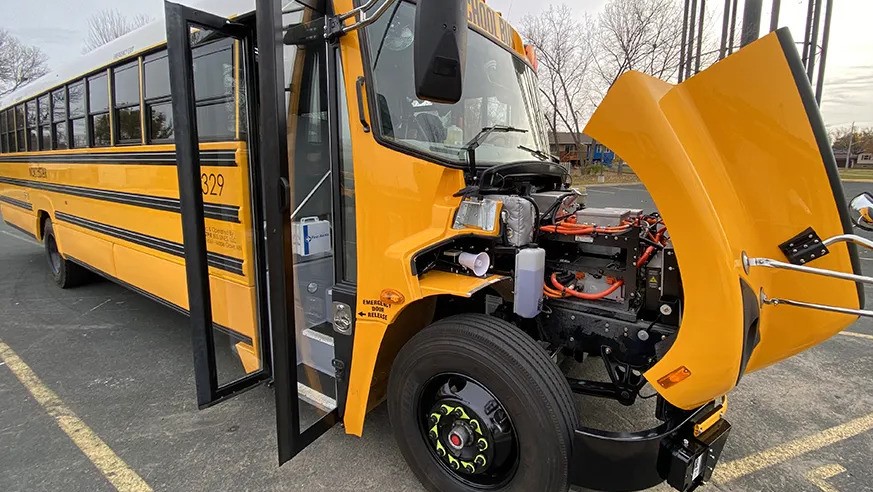
Fresh Energy’s staff are dedicated to decarbonizing Minnesota’s transportation sector and transforming the way we move our people and our goods. Since 2019, an important focus of this work has been engaging in how Minnesota can best utilize the $47 million allocated to our state from the national Volkswagen (VW) settlement. Investing these dollars in innovative clean transportation across Minnesota leads to cleaner air, increased access to electric transportation, and economic development.
Many of the VW funds have been used to clean up heavier vehicles, such as buses, trucks, and equipment. A new report released by Fresh Energy and the Coalition for Clean Transportation clearly shows that electrifying medium- and heavy-duty vehicles is good for climate, long-term cost savings, and public health. Electrifying these vehicles is especially important given they contribute 62 percent of the nitrogen oxide (NOx) pollution on Minnesota roadways, which adversely and disproportionately impacts communities of color and under-resourced communities sited along busy roadways.
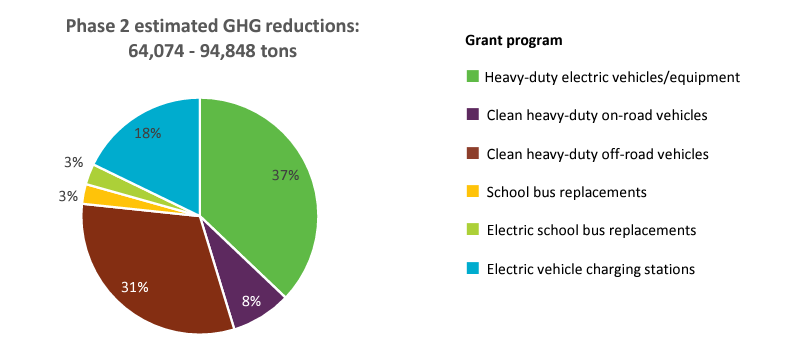
Need a refresher on the Volkswagen settlement? Want to know where we’re at in the process, and what’s next on Fresh Energy’s radar? Let’s dive in!
What is the Volkswagen settlement?
If you’re a Minnesotan, you may remember that in 1998 our state won a landmark settlement with tobacco companies. The dollars from this settlement funded decades of public health programs, anti-smoking campaigns, and more. While it’s not apples to apples with the tobacco settlement, the Volkswagen settlement has some similarities.
In 2016 the United States Environmental Protection Agency (EPA) filed a complaint alleging that Volkswagen, a German vehicle manufacturer, had violated the Clean Air Act by selling approximately 580,000 motor vehicles that contained diesel engines equipped with “defeat devices” between model years 2009-2016. These “defeat devices,” in the form of computer software, were designed so that the vehicle would perform differently during normal vehicle operations than during emissions testing. The software was programmed to “know” when the vehicle was receiving emissions testing and perform better than typical, e.g. emitting less than the allowable levels of pollutants. However, during normal use, the vehicle would emit levels of nitrogen oxides (NOx) much greater than the EPA’s allowable levels.
As part of the settlement agreement that was reached between Volkswagen and the United States federal government, Volkswagen paid $2.9 billion dollars into a fund called the Environmental Mitigation Fund, which is sometimes referred to as the “settlement fund.” This fund was created to help states and tribes clean up excess NOx emissions emitted by the VW vehicles.
The state of Minnesota is expected to receive $47 million in environmental mitigation trust funds over 10 years, starting in 2018, for projects that reduce NOx emissions in our state. The settlement fund allocated money to states based on the number of vehicles sold in the state that were equipped with the deceptive defeat devices.
Governor Walz appointed the Minnesota Pollution Control Agency (MPCA) to manage these funds and related programs and over the years Fresh Energy has helped the MPCA engage Minnesotans in creating and giving public input to the state plan. Read what Minnesotans said about the plan.
The Minnesota Pollution Control Agency has split this funding opportunity into three phases.
- Phase 1 (2018-2019): 11.75 million or 25 percent of the total funding.
- Phase 2 (2020-2023): $23.5 million or 50 percent of the total funding.
- Phase 3 (2024-2027): $11.75 million or 25 percent of the total funding
How can the Volkswagen settlement funds be used?
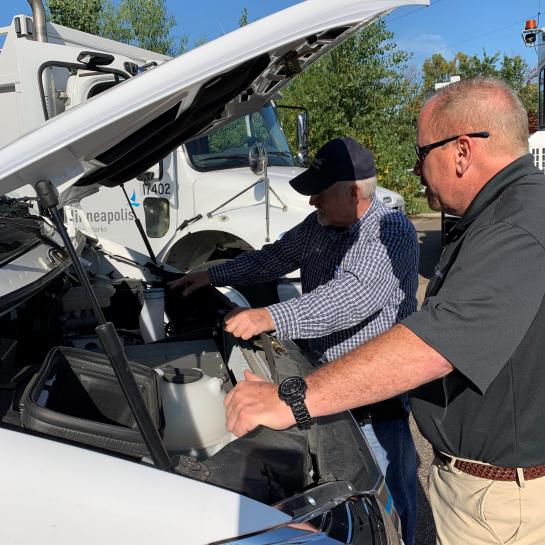
The settlement funds were designed to clean up air pollution from diesel vehicles. The court case focused on reducing NOx emissions, but the funds can also be used more broadly to benefit Minnesotans and advance state priorities including reducing greenhouse gas (GHG) emissions to help slow the impacts of climate change.
Under the terms of the settlement, funds can be used in two primary ways. The first is to fund vehicle replacements, taking high-polluting diesel vehicles off the roads and replacing them with newer, cleaner models powered by a variety of fuel types, including electricity. The second is to invest in electric vehicle (EV) charging. Up to 15 percent of settlement funds can be used to install EV charging stations.
How have the funds been used in Minnesota so far?
Phase 1 of the funding (2018-2019) allocated $11.75 million to grant programs across five categories: transit buses and trucks, off-road equipment, school buses, heavy-duty electric vehicles, and EV charging stations. From EV chargers in Coon Rapids to electrifying a terminal tractor in Northfield and many projects in between, the grants are making an impact in Minnesota.
There was also a specific grant program to replace heavy-duty diesel vehicles like tow tractors or step vans with electric models. Phase 1 funded the replacement of more than 250 older diesel vehicles and equipment!
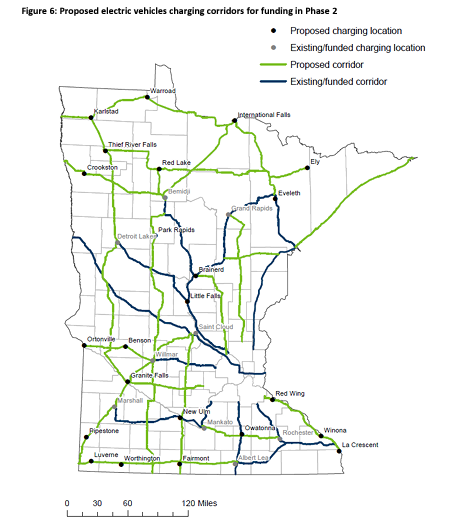
In addition, Phase 1 funded the installation and purchase of 22 DC fast charging stations as well as several Level 2 charging stations in our state, including many along highways in Greater Minnesota. In total, nearly $800,000 went toward amping up EV adoption and EV charging across Minnesota, plus an additional $630,000 that was initially set aside for electric school buses! Since only one electric school bus was awarded during Phase 1, the remaining funds will be carried over to future electric school bus grant opportunities. Check out the full list of grantees and projects funded through Phase 1.
What’s next for the Volkswagen settlement funds?
We are now in Phase 2 of the funding (2020-2023). Phase 2 funding has been allocated to six grant programs and has dedicated 65 percent of available funds to support electrifying our transportation sector. MPCA will invest approximately $7 million in eligible heavy-duty EVs like trucks and transit buses, $4.7 million in electric school buses (via a pilot that launched last year), and $3.5 million in EV charging stations. Specifically, Phase 2 plans to fund 14 electric school buses and 64 heavy-duty electric vehicles, among other investments.
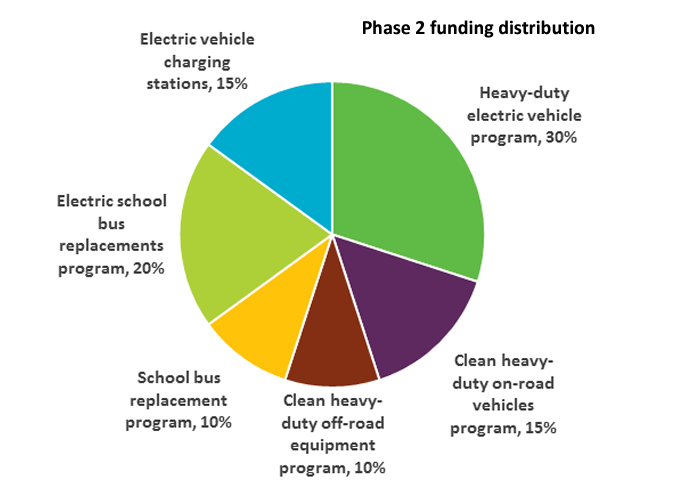
In addition, Phase 2 will support the installation of 104 Level 2 electric vehicle chargers and 43 DC Fast Chargers. , with a portion of them to be installed by Minnesota-based EV charging company, ZEF Energy. For reference, Minnesota currently has 441 Level 2 charging stations and 55 public DC fast chargers.
Get the scoop
For more information on how Minnesota plans to spend the Volkswagen Settlement Funding, read the State Plan. You can also sign up to receive updates directly from MPCA related to the Volkswagen Settlement to ensure your local businesses and communities don’t miss a funding opportunity.
Interested in applying for a heavy-duty electric vehicle replacement grant from MPCA? Applications must be submitted by 4:30 p.m. CT on Wednesday, August 31, 2022. Here’s a full list of deadlines for these grants:
- Online training for applicants – Wednesday, June 31, 2022
- Grant-related questions due to MPCA – Tuesday, August 16, 2022
- Applications due – Wednesday, August 31, 2022
Amping up Minnesota’s clean transportation progress with cleaner and electric medium- and heavy-duty trucks, equipment, and school buses is critical to keeping our state on track to meet its GHG emissions reduction goals and ensures that communities across Minnesota breathe cleaner air.
Fresh Energy staff will continue to be engaged at all stops on this journey, and we look forward to keeping you in the loop on ongoing progress. Stay tuned by signing up for our monthly e-newsletter!
